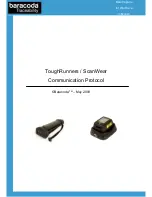
Voice Mail
DSX Feature Handbook
Features
◆
167
Features
Voice Mail
Description
The system is fully compatible with IntraMail, UltraMail, and NVM-Series Voice Mail with Automated
Attendant Systems. These systems provide telephone users with comprehensive voice mail and Automated
Attendant features. Automated Attendant automatically answers the system’s incoming calls. After listening
to a customized message, an outside caller can dial a system extension or use voice mail.
When installing
voice mail, refer to the documentation provided with your voice mail system for the speci
fi
cs.
Integrated voice mail enhances the telephone system with the following features:
Call Forwarding to Voice Mail
An extension user can forward their calls to voice mail. Once forwarded, calls to the extension connect to
that extension’s mailbox. The caller can leave a message in the mailbox instead of calling back later. For-
warding can occur for all calls immediately, for unanswered calls or when the extension is busy, or just for
unanswered calls.
Leaving a Message
Voice mail lets a keyset extension user easily leave a message at an extension that is unanswered, busy, or in
Do Not Disturb. The caller just presses
V-MAIL
to leave a message in the called extension’s mailbox. There
is no need to call back later.
Transferring to Voice Mail
By using Transfer to Voice Mail, an extension user can Transfer a call to the user’s own or a co-worker’s
mailbox. After the Transfer goes through, the caller can leave a message in the mailbox. The caller will hear
the entire mailbox greeting after the Transfer goes through.
Conversation Record
While on a call, an extension user can have voice mail record the conversation. The keyset user just presses
their Record key. Once recorded, the voice mail stores the conversation as a new message in the user’s mail-
box. After calling their mailbox, a user can save, edit or delete the recorded conversation. The ability to use
Conversation Record is controlled by an extension’s Class of Service.
Conversation Record Key for a Co-worker’s Mailbox
An extension user can have a Record key for a co-worker’s mailbox. While on a call, the user can press the
key to record their conversation directly into the co-worker’s mailbox. The user can set up the Record key to
record into any valid Subscriber Mailbox (including IntraMail Group Mailboxes and Master Mailboxes pro-
grammed as Subscriber Mailboxes). This could help a dispatcher, for example, that wants to record a conver-
sation with a client right into the responsible technician’s mailbox.
An extension can have multiple Record keys, each associated with a different mailbox. In addition, setting
up a Record key for a co-worker’s mailbox is also available on DSS Consoles.
Voice mail ends the frustration and cost of missed calls, inaccurate written messages and
telephone tag, freeing up the company’s receptionists and secretaries for more production work.
Caution
The use of monitoring, recording, or listening devices to eavesdrop, monitor, retrieve, or record telephone
conversations or other sound activities, whether or not contemporaneous with transmission, may be ille-
gal in certain circumstances under federal or state laws. Legal advice should be sought prior to imple-
menting any practice that monitors or records any telephone conversation. Some federal and state laws
require some form of noti
fi
cation to all parties to a telephone conversation, such as using a beep tone or
other noti
fi
cation methods or requiring the consent of all parties to the telephone conversation, prior to
monitoring or recording the telephone conversation.Some of these laws incorporate strict penalties.
Summary of Contents for DSX-160
Page 1: ...Features DSX Telephone Feature Handbook 00 01 13 Introduction Telephone Features ...
Page 8: ...Table of Contents vi Table of Contents DSX Feature Handbook ...
Page 16: ...Telephone Illustrations 8 Features DSX Feature Handbook ...
Page 186: ...Walking Class of Service 178 Features DSX Feature Handbook ...
Page 187: ......














































